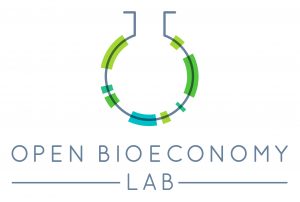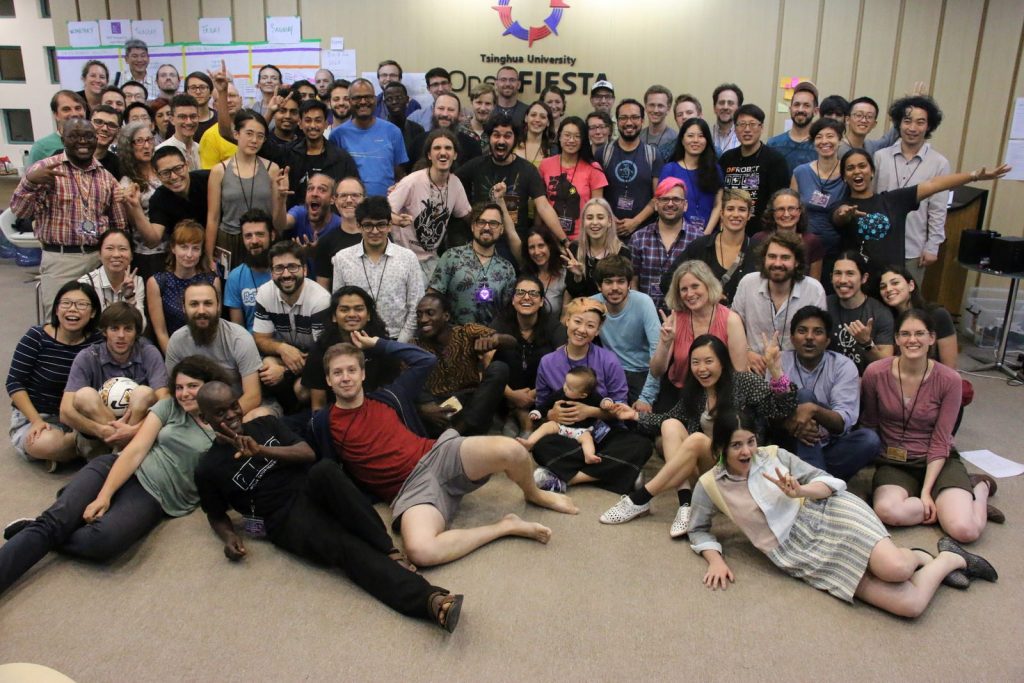A review of the Gathering for Open Science 2018 written for PLOS by Jenny Molloy. GOSH 2018 brought over 110 of the most active developers and users of open hardware to Shenzhen, China for four days in October 2018 to discuss scaling hardware and growing community in open science.
Experimental science is typically dependent on hardware tools: equipment, sensors, machines which can be expensive and difficult to access and customise. Open Science Hardware means sharing designs for equipment that anyone can reuse, replicate, build upon or sell so long as they attribute the developers on whose shoulders they stand. A growing number of initiatives are also sharing chemicals, cell lines and materials with few or no restrictions on use.
The Gathering for Open Science Hardware is an international meeting that brings together a group of the most active individuals and communities who are developing, using or otherwise furthering open science hardware in all its forms. Our third convening took place in October 2018 at the Open Faculty of Innovation, Education, Science, Technology and Art (OpenFIESTA) of Tsinghua University in Shenzhen, China – the “hardware capital of the world”. With kind support from PLOS and other sponsors, we gathered a diverse group of over 110 scientists, engineers, entrepreneurs, artists, educators and not-for-profit organisations from 34 countries. GOSH participants met over four days for discussions, workshops and unconferences around the theme “scaling hardware, growing community” with the goal of actioning the Global Open Science Hardware Roadmap to make open science hardware ubiquitous by 2025.
Science tools reaching more people for more purposes
Open Science Hardware is intended to ensure that more and more diverse people in more places can contribute to furthering scientific research, education and culture. During the meeting there were many sessions or practical workshops that represented this diversity and we are only able to provide a few examples here. In some cases hardware was designed to be low-cost and “hackable” for educational purposes. For example, Oliver Keller led a workshop building Muon Hunter particle detectors and discussed their use in education and citizen science. Other hardware is designed to make technology accessible where very few commercial options exist, such as the OpenDrop and DropBot digital microfluidics platforms, which move droplets of liquid with electrostatic forces. These can be adapted for a range of research uses and applications such as diagnostics.
Microscopes remain a fertile ground for innovation in the GOSH Community and in addition to the latest version of the 3D-printed, high precision OpenFlexure scope we saw the FluoPi from Isaac Nuñez and Tamara Matute, a chamber for imaging fluorescent bacteria that won the 2018 PLOS Open Source Toolkit Channel prize; the FlyPi from Andre Chagas designed for neuroscience experiments including optogenetics and the latest iteration of the Public Lab community microscope for analysing particulate pollution that can be used by their community of over 10,000 people interested in understanding and improving their environment.
Environmental monitoring and field research is a very active area. GOSH 2018 was introduced to digital naturalism by engineer Andrew Quitmeyer who led a workshop on the “field labs of the future”. A session on water quality monitoring highlighted many efforts in the US, Latin America and China using DIY and open source equipment for both academic and community-based science. All of these examples take advantage of at least some of open science hardware’s many potential benefits, for example being adaptable and customisable, locally manufacturable, lower-cost, easier to maintain and repair, increasing autonomy and building capabilities.
Advancing the GOSH Community Roadmap through learning, supporting and growing
Each of the first three days featured a new topic session on the three themes of the GOSH Roadmap: Learn, Support and Grow. These were continued through community-curated discussions and hands-on workshops. “Learn” took the form of a conversation on the ways in which open science hardware can enrich learning and how we can assess its impact. Initiatives from GOSH community members span from school science clubs and extracurricular activities like those provided by Kharkana in Nepal and Litchee Lab in Shenzhen to professional training for early career researchers like the Advanced Labware Workshop held in Cape Town by TReND in Africa. There was recognition that education happens outside of the classroom in complex communities and that open science hardware enables students to identify and solve real world problems as evidenced by the TECNOx undergraduate competition in Latin America. However, the resulting learning outcomes can be harder to evidence and educational research is needed to address this issue.
“Support” covered ways in which the community can help each other in our work and gain external support and funding. Leonardo Sehn based at the Centro de Tecnologia Acadêmica, UFRGS in Brazil started the discussion by emphasizing the need for continuous and ongoing documentation in open source hardware development and ongoing technical and social efforts to improve this. Transparency and clarity in documentation helps in attracting Kickstarter funding, as confirmed by their Senior Design & Technology Outreach Lead Clarissa Redwine who also emphasised the importance of mobilising your community. On average, 30% of a Kickstarter project is funded by backers on the platform but 70% is funded by the proposer’s network. Finding the right community and ecosystem can therefore be vital and Violet Su next introduced x.factory, the Seeed Studios IoT Hardware enabler space that enables makers to go from idea to product by accessing the Shenzhen hardware ecosystem.
Ecosystem thinking preempted the “Grow” session that examined different routes to scaling. One route being explored by several of the >15 companies represented at GOSH 2018 is commercial manufacturing and distribution but we also discussed the need to increase the diversity, scale and impact of the OScH community in many ways and with respect to local differences. Chiu Chau of OpenTrons, who manufacture open hardware robots for pipetting liquids in laboratories, shared lessons from his entrepreneurial journey and possible avenues for financial sustainability and growth of open science hardware projects and organisations. He emphasised the need for passion, humility and determination but also community support. Returning to the theme of support for moving projects to scale, Jo-An Ho of the HAX hardware accelerator described their process of achieving success for their portfolio of companies and how one week of hardware development in Shenzhen is worth a month elsewhere due to the sheer concentration of goods and services in this vibrant city of technology.
Open Science Hardware in 2019: going global, keeping local
Other themes that emerged during GOSH 2018 included the role of open science hardware in different regions and sectors, for example PLOS specifically supported a session on “Boosting OScH in academic context: opportunities and challenges”. Going forward, the GOSH Community is evolving from convening around an annual Gathering and our online forum to a globally distributed network of events, activities, residencies and topic-based working groups and projects. Coming up in 2019 is the second Africa Open Science and Hardware meeting in Dar es Salaam, Tanzania; a planned North America event; technical residencies in Latin America; further community building in China plus work on 155 actions and pledges to progress openness in research tools and make hardware a recognised and valuable component of open research practices.
We invite anyone to sign the GOSH manifesto, join the GOSH Forum to share their thoughts and projects, collaborate on the community actions hosted on Gitlab. Together we aim to take open science hardware global while fostering local initiatives to ensure that more people have access to vital enabling technologies for science.


